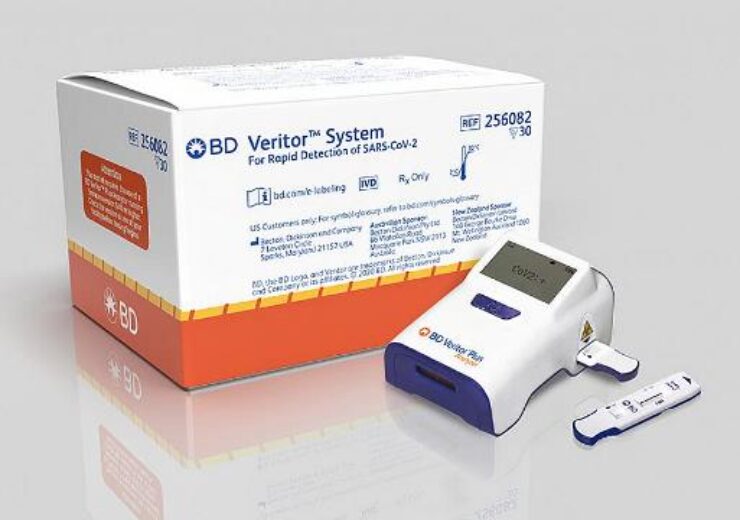The funds will be used for the development, validation, manufacturing and scaling of 12 new rapid diagnostic tests for SARS-CoV-2

BD Veritor system for rapid detection of SARS CoV 2. (Credit: The National Institutes of Health)
The National Institutes of Health (NIH), part of the US Department of Health and Human Services, has granted $77.7m contracts to develop new rapid diagnostic tests for Covid-19.
The funds will be used for the development, validation, manufacturing and scaling of 12 new rapid diagnostic tests for SARS-CoV-2, the virus responsible for Covid-19.
Part of the Rapid Acceleration of Diagnostics (RADx) initiative, the home and point-of-care testing platforms are mainly aimed at meeting the need high-performance and low-cost tests for the detection of multiple respiratory infections.
The new grants are in addition to 33 that the regulator earlier disbursed via its RADx Tech technology development programme.
RADx Tech leader and National Institute of Biomedical Imaging and Bioengineering (NIBIB) director Dr Bruce Tromberg said: “These technologies represent important innovations to address the need for ready access to rapid, low-costs tests everywhere in the country, including in every home.”
NIH’s grants will be used for new tests designed for viral RNA detection and viral antigen detection.
The viral RNA detection tests include Palogen’s nanoelectronic biosensor that identifies SARS-CoV-2 RNA in three minutes and Detect’s reverse transcriptase-loop mediated isothermal amplification (RT-LAMP) platform with mobile app-guided instructions to identify SARS-CoV-2 in around 60 minutes.
Quidel’s real-time PCR platform will help simultaneously identify influenza A/B, respiratory syncytial virus and SARS-CoV-2 within 25 minutes.
Uh-Oh Labs’ portable and reusable RT-LAMP device with single-use cartridges hold the potential to identify SARS-CoV-2 within 30 minutes.
University of California’s Covid-19 next-generation sequencing technology will be scaled up to enhance surveillance of cases and variants in the US.
The viral antigen detection tests consist of BD’s lateral flow immunoassay with a reader to deliver electronic results intended to be used in point-of-care settings and an at-home lateral flow test that is digitally read by a smartphone.
The tests also include Ellume USA’s single-use and digital fluorescent immunoassay antigen test for SARS-CoV-2 and influenza A/B detection and Luminostics’ rapid, smartphone-connected, antigen immunoassay that uses glow-in-the-dark nanomaterials to detect and differentiate SARS-CoV-2 and influenza A/B.
LumiraDx’s microfluidic immunofluorescence assay, Princeton BioMeditech’s lateral flow assay antigen test and Quidel’s two lateral flow assays are among the tests receiving the grant support.
